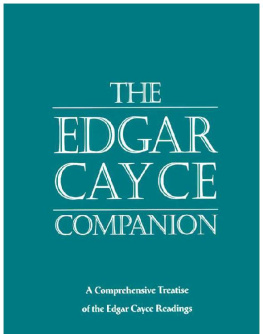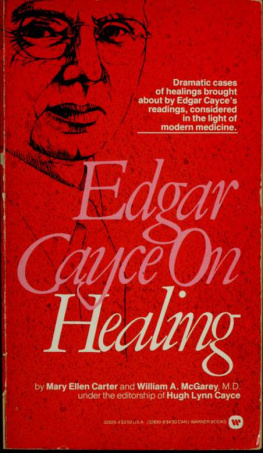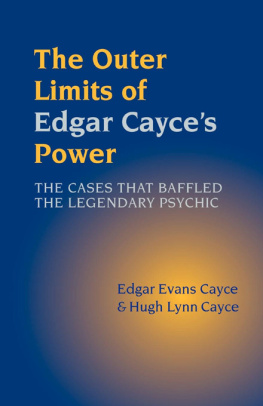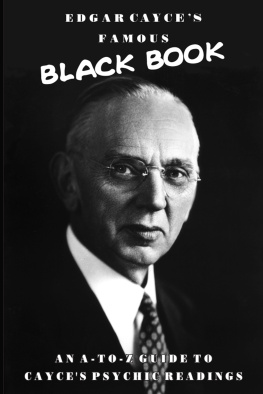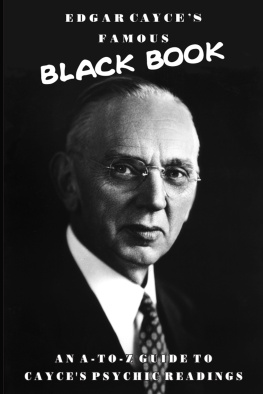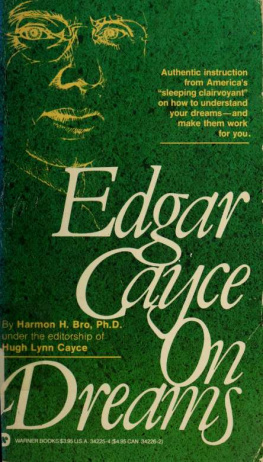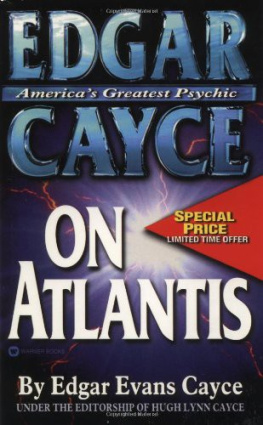Edgar Cayces
Origin and Destiny of Man
Edgar Cayces
Origin and Destiny of Man
Lytle Webb Robinson

Copyright 2008
by the Edgar Cayce Foundation
First A.R.E. Press edition: April 2008
Printed in the U.S.A.
All rights reserved. No part of this book may be reproduced or transmitted in any form or by any means, electronic or mechanical, including photocopying, recording, or by any information storage and retrieval system, without permission in writing from the publisher.
A.R.E. Press
215 67th Street
Virginia Beach, VA 23451-2061
ISBN 978-0-87604-541-1 (trade pbk.)
Coward, McCann & Geoghegan edition published 1972
Berkley edition published September 1976
Edgar Cayce Readings 1971, 1993-2007
by the Edgar Cayce Foundation.
All rights reserved.
Cover design by Christine Fulcher
CONTENTS
A NOTE CONCERNING THIS BOOK
By
Barbara A. Robinson
The author of this book, Lytle Webb Robinson, passed through Gods other door on April 4, 1997, one week before his 84th birthday. He had been hospitalized for several days before being transferred to a private hospice room, where he lapsed into a state of semi-consciousness.
Our four children joined me in a vigil in that clinical setting, and the conversation evolved into a sharing of family stories. We laughed often at past events. To the nurse who checked in frequently, we must have resembled a group in an airport departure area who had gathered to wait with a loved one until time for his plane to leave. A considerable length of time elapsed before there was a lull in the conversation. Just at that moment, some flickering change came over Lytles face. We reached out and touched him as he took one final breath. His flight had departed. Apparently, he had been listening and chose to remain with us through the review of our lives together.
I open with this story of Lytles death as a means of informing readers that his book is not new but a reprint of one first issued in 1972. The text continues to be relevant, however, because most of the information presented is followed by the verbatim Extracts from the Cayce Readings. For those interested, this book has been translated into French, German, Japanese, and Braille.
It came to be written because in the mid-1950s, Hugh Lynn Cayce, Edgar Cayces son, was actively recruiting writers to introduce the Edgar Cayce psychic readings to the growing roster of members. Since Lytle was a freelance writer, he was invited to write a comprehensive article on the subject of Creation. To access the material needed for this initial writing project, we traveled to Virginia Beach and stayed in an upstairs bedroom in the Cayce home at 308 Arctic Crescent. A fire-proof vault housing the readings had been installed at that residence, and Gladys Davis, Edgars secretary, also had her office there. It seems unthinkable now, but at that time no copying machines were available, and all extracts of the Cayce readings had to be hand-copied or typed, since they were not to be removed from the premises.
Lytle was employed full-time in merchandising, and wrote in the evenings at our home, so we made several Virginia Beach trips to acquire information from the readings. Typing these extracts became my contributiona privileged onesince it gave me the opportunity to become friends with Gladys. As most know, she not only personified those spiritual qualities which we all strive to attain, but she had a phenomenal memory. Even though the over 14,000 Cayce readings were only partially cataloged, she was able to access information on a wide variety of topics. Whenever we visited, Gladys put other responsibilities aside to assist Lytle, and the times we stayed in the Cayce home, she would leave the vault unlocked at night so that we could obtain readings and type copies well into the night. Gladys deserves credit for all of the early Cayce publications because writers depended on her expertise and generous spirit.
As for Hugh Lynn Cayce, he came across as the consummate professional, but behind that formal faade he genuinely cared about people and reached out to meet their needs. Two of his letters, written over 50 years ago, are still in my files. The first one referred to a theological matter we had discussed but not resolved; the second alluded to his intervention on behalf of our infant son when he was seriously ill. Edgar Cayce set the precedent for reaching out to uplift others, but Hugh Lynn incorporated that philosophy into the A.R.E. standards of operation where it continues to this day.
How we think and act in our relationships with one another determines our own destiny and contributes to the universal destiny of mankind. Therefore we may drift aimlessly through life or choose consciously to awaken spiritually and return to a state of oneness with God. In this difficult undertaking, the Edgar Cayce Life Readingsrevealing strengths, weaknesses and inclinationsare invaluable because they emphasize human conditions common to all of us.
Because we seldom review a life reading in entirety, one will be included at the end of this book, followed by a personal evaluation, The Impact of a Life Reading, written by the recipient many years later. That person is Lytle W. Robinson.
Tucson, Arizona
July, 2007
Foreword
Every once in awhile a man comes along who completely upsets the accepted scheme of things. What he says or does challenges our entire concept of the natural and the normal; a new path is cut through the jungle of the unknown.
Sigmund Freud once said that there are three steps in the history of a great discovery. First, its opponents say that the discoverer is crazy; later, that he is insane and that his discovery is of no real importance; and last, that the discovery is important but everybody has known it right along.
Edgar Cayce did not discover anything in that sense of the word, but his diagnoses, treatments, analyses, and predictions have done much to bring attention to a new concept of the power of the human mind. He has been called The Sleeping Prophet, Americas Greatest Psychic, The Mystery Man of Virginia Beach, The Man Who Saw Today, Tomorrow, and Yesterday.
Although Cayce died in 1945, his over 14,000 readings, given while in a state of deep sleep or self-hypnosis, are very much alive and gaining new respect. His principle biography, There Is a River, by Thomas Sugrue, is now widely available, and it first appeared in 1942. Many books on his life and works have been translated into German, French, Japanese, and even Sinhalese. His contributions to modern thinking in the fields of medicine, theology, philosophy, and parapsychology are considerable. Gradually, the Cayce records are becoming recognized as an intriguing, provocative, valid source of information. The historical references dealt with in this volume, controversial to be sure, are nevertheless enlightening. Predictions in national and international affairs, many of which are even now transpiring, are perceptive indeed. They are discussed in Part Three.
Cayce (pronounced Casey) had the uncanny ability of putting himself to sleep at will and speaking in an authoritative voice on subjects far beyond the range of his normal knowledge. He was not even an avid reader of books. All he needed was the subject to be discussed, or the inquiring persons name, address, and whereabouts, a conductor to make suggestions and ask the questions, and a stenographer to take it all down. Almost every day for forty-two years, he went to sleep and answered questions covering an immense range of subject matter. He could do this at any time, any place. There were no darkened rooms, turbans, incense, crystal balls, or paying audiences.
Next page

